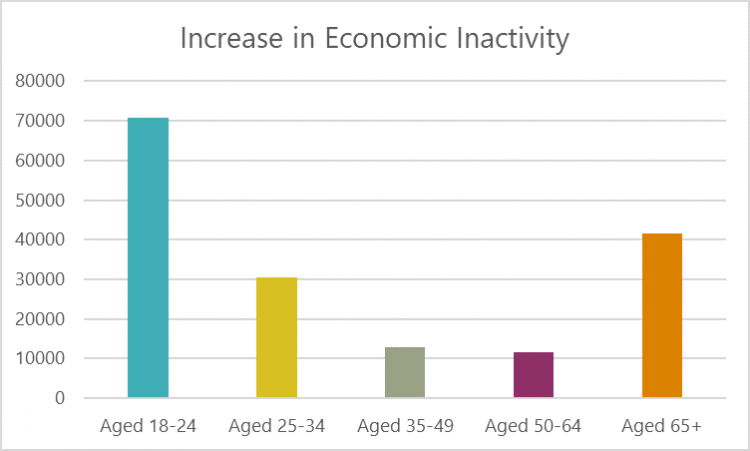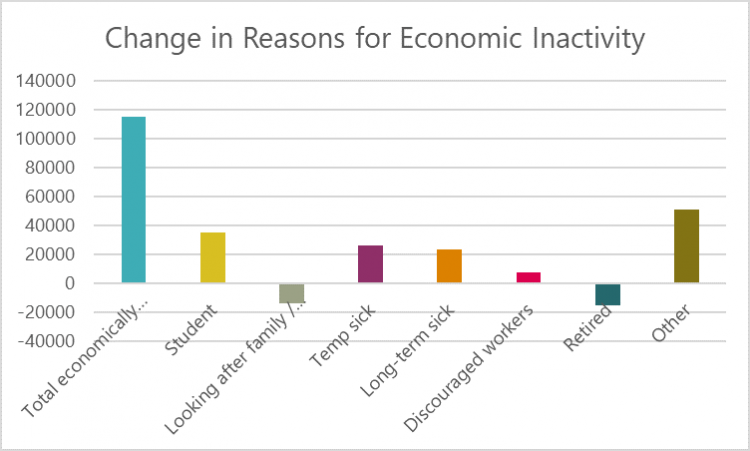Why are people dropping out of the workforce?
If the response to last week’s employment news could be summed up in two words, it would be ‘Bah! Humbug!’ Yes, when the Ghost of Christmas Past paid a visit to Phillip Hammond last night, the Chancellor was given a message he wasn’t used to hearing: employment has fallen. To make matters worse, real wages are down for the eighth month in a row. And we’re worse off this Christmas than we were a decade ago.
So what should we make of this unwanted Christmas jumper of festive news? To help us understand what exactly is going on, it’s worth taking a look at one surprising finding from Wednesday’s figures.
What is economic inactivity?
This week’s employment statistics recorded a surprising increase in people dropping out of the workforce. Or as economists call it: economic inactivity. Of course, it’s not unusual to become a little more inactive at this time of year. But economic inactivity means something a bit different to the usual December sluggishness. The Office for National Statistics, the government agency that released Wednesday’s jobs figures, defines an economically inactive person as someone who is not employed or unemployed. There are a range of reasons why someone may be economically inactive. Students, the long-term sick and retired workers all come into this category.
Who’s dropping out of the workforce?
Wednesday’s figures revealed that there were 157,000 more economically inactive people between August and October than there were between May and July. While the numbers of economically inactive people have risen in every age group, people under the age of 35 formed the largest part of this increase. In fact, the older you are, the less likely you are to drop out of the workforce. While the rate of economic inactivity rose from 29.7% to 31% for those between the ages of 18 and 24, it was unchanged for those between the ages of 50 and 64. While there was a significant increase in the number of workers over the age of 65 becoming economically inactive, this seems to be the result of an aging population. In fact, despite the increase, a lower proportion of those over the age of 65 dropped out of the workforce.

Why are people dropping out of the workforce?
A range of reasons are behind this increase in economic inactivity. 35,000 more people gave studying as their reason for being economically inactive. Of course, a rise in the number of people in full-time education could be a good thing for the economy in the long run. The fact, however, that an extra 51,000 people are dropping out of workforce for ‘other’ reasons is not such good news. While these ‘other’ reasons remain shrouded in mystery, we do know that most of the new economically inactive in this group do not want to work. With young people’s job prospects being particularly affected by time out of the workforce, this increase in economic inactivity for ‘other’ reasons should definitely be seen as a cause for concern.
But some of the trends revealed by Wednesday’s figures are certainly worrying. While still a relatively small group, the number of discouraged workers dropping out of the workforce has grown by a quarter. The overwhelming majority of these discouraged workers would like to work.
And increasing numbers of people are on sick-leave rather working or looking for work. An extra 26,000 people have dropped out of the workforce due to long-term sickness. Almost all of this growth has taken place amongst people who do want a job. There’s also been a 16% increase in the number of people becoming economically inactive due to temporary sick-leave, the majority of which do not want a job.
Some reasons for economic inactivity, however, have become less common. With 15,000 fewer people retiring before the age of 65, it seems that more older workers are choosing to say in work rather than opt for early retirement. It’s impossible to say whether that’s a good or bad thing. Improving health could be making it easier for some people to work for longer while lower than expected savings may be forcing others to put off retirement. It’s also difficult to say why fewer people are dropping out of the workforce to look after family

Time to act
We won’t know until next year whether these changes are blips or whether they’re here to stay. But one thing is clear- real wages are falling. They have been for 8 months. And unless the Government acts to end this Narnian winter of pay restraint, the Chancellor can expect yet another visit from the Ghost of Christmas Yet-to-Come.
Stay Updated
Want to hear about our latest news and blogs?
Sign up now to get it straight to your inbox
